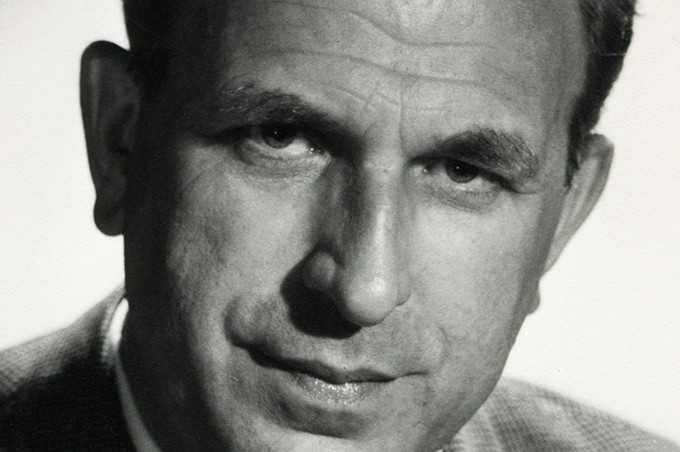22 December 2023
P.R. Jenkins
Karajan artists: Giuseppe Taddei – Papageno and pappardelle
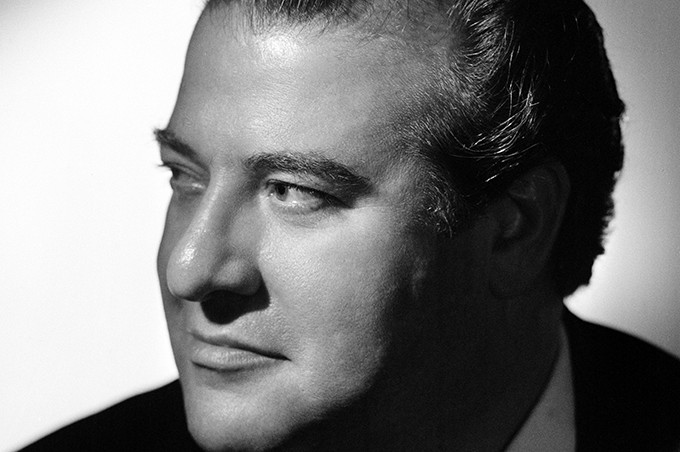
He is the artist Karajan worked with longer than with anyone else – 34 years! The Italian baritone Giuseppe Taddei was in Karajan’s line-ups between 1948 and 1982 and he is also the oldest singer to perform a title role in a Salzburg Karajan production. In summer 1982, when he appeared as Falstaff, he was already 66 years old.
Taddei started working with Karajan almost immediately after the war. The singer performed for the American forces in Salzburg. One day in 1946, after a concert in Bad Gastein, the Secretary of the Vienna Gesellschaft der Musikfreunde, Rudolf Gamsjäger introduced him to “a brilliant young Austrian conductor”. The man standing in the door pointed at Taddei and said in fluent Italian: “YOU will be my first Figaro in Salzburg!” Taddei was surprised, especially as he recognized the man who had been sitting in the first row of the audience.
“At the end of the concert when I performed Figaro’s cavatina ‘Largo al factotum’ from ‘Il barbiere di Siviglia’ he was so excited he almost fell off his chair.”
And indeed – their first collaboration was Mozart’s “The Marriage of Figaro” in Salzburg in 1948 and up to 1955 they performed 21 times together, always in Mozart operas: “Figaro” (Figaro), “Don Giovanni” (Leporello) and “The Magic Flute” (Papageno) in Salzburg and Milan. After Karajan’s nomination as head of the Vienna State Opera, Taddei appeared as Scarpia and Jago and as Schaunard in the legendary Karajan/Zeffirelli “Bohème”. This production caused a bit of a disgruntlement between Karajan and the self-assured singer because Taddei wasn’t allowed to sing the more attractive part of Marcello.
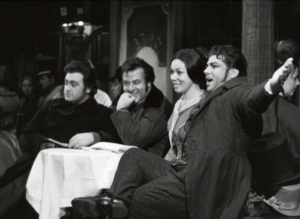
After Karajan’s resignation, they stopped working together for the stage but still joined up in the studio and recorded the 1962 “Tosca” with Taddei as Scarpia and the 1965 “Pagliacci” with him as Tonio. Taddei recalled:
“‘Tosca’ was my first studio experience with Karajan but we had known each other for a long time. With him everything went perfectly, one couldn’t think of any glitches. […] It fascinated me to watch Karajan at work. No matter what he did – on the rostrum, in the cutting-room or studying the score – he gave the impression of utmost concentration, he was always keyed up. Did he ever do anything randomly? The maestro had everything under control. What he did simply had to succeed. He had superior intelligence and knowledge, elegance, serenity and foresight and he had the natural authority of a strong personality. His instructions were polite but firm and he always kept his sense of humor. Even when he asked me: ‘Peppino, where shall we eat?’, he was concerned with the elementaries – it had to taste good!”
Karajan recorded “Tosca” for Decca-RCA with a cast that also included Leontyne Price and Giuseppe di Stefano. The firing squad in Act 3 posed a problem for the recording. It sounded absurd indoors, and in those days, it was not possible to decamp to some distant field, play the music on one machine, fire the rifles, and re-record the whole effect on a second machine. In the end, it was decided to use the open-air courtyard at the side of the Sofiensäle and to schedule the session for a Sunday afternoon when traffic noise would be at a minimum. It was not a good idea. A practice fusillade roused local residents who were sleeping off their Sunday lunch. Within minutes the place was surrounded by police. Fortunately, the police saw the funny side of it. Having checked the rifles to make sure real bullets were not being used, they helped pacify the residents.
Taddei reports that in the early 1960s, Karajan encouraged him to study the role of Hans Sachs in Wagner’s “Die Meistersinger von Nürnberg” in order to record it in German(!) with him – quite an honourable offer, especially for an Italian singer. It didn’t happen but Taddei performed the part 40 times in Italian.
Their last collaboration was the 1980 – 1982 “Falstaff” production in Salzburg, recorded in the studio and as a film.
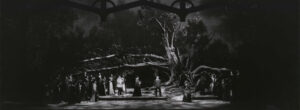
“Verdi, Karajan and me – I couldn’t imagine a better way of finishing my work in the studio.”
Taddei had performed the part since 1949 (practically all the time he knew Karajan) when he was hired but it needed a “little help” from Karajan’s assistant Peter Busse. Busse witnessed a “Gianni Schicchi” performance with Taddei at the Vienna State Opera during Karajan’s “Trovatore” in 1978. Not knowing that Karajan was preparing a “Falstaff”, the staff of the State Opera asked Busse: “Hey Peter, why don’t you guys do anything with Peppino in Salzburg?” Busse said nothing about Karajan’s plans but he proposed Taddei to the maestro. Karajan slapped his forehead. “Of course! Why didn’t I think of it? Of course, we’ll take Taddei as Falstaff!”
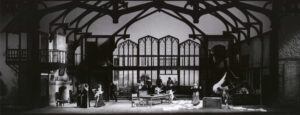
The collaboration was a joyful matter for both men. They appreciated each other’s deep understanding of the music and the character of the old bon vivant. Taddei recalled: “At the beginning of the third act, in Falstaff’s monologue ‘Mondo ladro’, when I was singing ‘Non c’e più virtù. Tutto declina.’ Karajan looked at me like in trance. He had stopped conducting. All Falstaff was in this phrase, his and mine.” Of course, there was plenty of light relief. In former productions, Taddei had been forced to use a costume belly which he hated. Luckily, Karajan laughed and said: “A costume belly? What for? Don’t you like your own? You are Falstaff as he lives and breathes!”
In 1985/86, Taddei celebrated his Met debut at the age of 69 – with “Falstaff”. It was a big success and Karajan sent a telegram with congratulations. This telegram was actually stolen from Taddei’s hotel room so we don’t know what was in it. But our institute owns a letter that Karajan sent when asked to write a short text for Taddei’s biography in 1984.
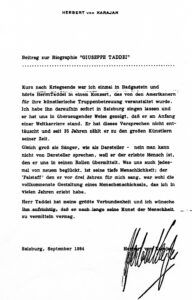
“Shortly after the war, I was in Badgastein and I listened to Mr. Taddei in a concert that the Americans organized for the artistic entertainment of their troops. I immediately engaged him for Salzburg and he proved to us in a very convincing way that he was at the beginning of a world career. He hasn’t disappointed us. For 35 years he has been one of the great artists of our time. He is equally magnificent as a singer and as an actor – one can hardly speak of ‘acting’ because he is the human being he performs in his roles. His humanity is something that really delights us again and again. His Falstaff was certainly the most perfect embodiment of a character I have witnessed in years. I have the greatest respect for Mr. Taddei and I honestly wish that he may be able to present his art to the world for a long time to come.”
Taddei wrote in his autobiography: “I would describe the reunion with maestro von Karajan, the paradigmatic Salzburg ‘Falstaff’ production in 1981 and the recording in 1980 as the peak, the zenith of my career.” Giuseppe Taddei died in 2010, aged 93.
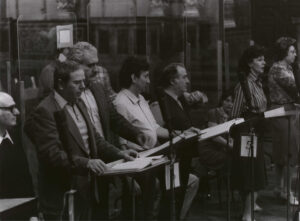
We’ve prepared playlists with Karajan and Giuseppe Taddei. Listen to them here.
— P.R. Jenkins
Giuseppe Taddei: “Ich, Falstaff… Erinnerungen” Amalthea Signum Verlag, Wien. 2006
Richard Osborne: “Karajan. A Life in Music” Chatto & Windus, London. 1998
